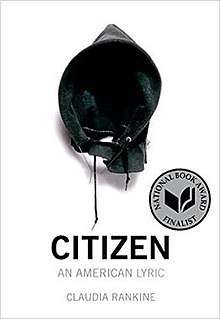Citizen: An American Lyric
Citizen: An American Lyric is a 2014 book-length poem[1] by American poet Claudia Rankine. Citizen stretches the conventions of traditional lyric poetry by interweaving several forms of text and media into a collective portrait of racial relations in the United States.[2] The book ranked as a New York Times Bestseller in 2015 and won several awards, including the 2014 National Book Critics Circle Award for Poetry[3], the 2015 NAACP Image Award for Outstanding Literary Work in Poetry[4], and the 2015 Forward Prize for Poetry Best Collection[5].
 The cover of the American softback first edition | |
| Author | Claudia Rankine |
|---|---|
| Country | United States |
| Language | English |
| Publisher | Graywolf Press (US)/Penguin Books (UK) |
Publication date | October 7, 2014 |
| Pages | 166 (softcover) |
| ISBN | 978-1-555-97690-3 (US sofcover) ISBN 978-0-141-98177-2 (UK softcover) |
In her critique of racism and visibility, Rankine details the quotidian microaggressions African-Americans face, discusses controversial incidents such as backlashes against tennis player Serena Williams, and inquires about the ramifications of the shootings of Trayvon Martin and James Craig Anderson. She intersperses her writing with images of various paintings, drawings, sculptures, and other digital media to "render visible the black experience"[6].
Summary
The book consists of seven chapters interspersed with images and artworks. The first chapter details microaggressions Rankine and her friends have experienced. The second chapter discusses the YouTube character Hennessy Youngman (created by Jayson Musson) and racial incidents in the life of Serena Williams. The third chapter features more microaggressions and the nature of racist language. In the fourth chapter Rankine writes of the transition of sighs into aches, the nature of language, memory, and watching tennis matches in silence. Chapter five is a complex poem on self-identity interspersed with more microaggressions. Chapter six is a series of scripts for "situation videos" created in collaboration with John Lucas on Hurricane Katrina, the shootings of Trayvon Martin and James Craig Anderson, the Jena Six, the 2011 England riots in the wake of the death of Mark Duggan, stop-and-frisk, Zinedine Zidane's headbutt of Marco Materazzi in the 2006 FIFA World Cup Final, and the verbal error during Barack Obama's first inauguration as President of the United States. The sixth chapter ends with "Making Room", a script for a "public fiction" about finding a seat on the subway, and a list of African-American men involved in recent police shooting incidents that concludes with the phrase "because white men can't police their imagination black men are dying". The seventh chapter is a complex meditation on race, the body, language and various incidents in the life of the author. The book is interspersed with images of various paintings, drawings, sculptures and screen grabs.
Reception
The book received enthusiastic reviews. Dan Chiasson, in the New Yorker, wrote that "[Citizen] is an especially vital book for this moment in time. ...The realization at the end of this book sits heavily upon the heart: 'This is how you are a citizen,' Rankine writes. 'Come on. Let it go. Move on.' As Rankine's brilliant, disabusing work, always aware of its ironies, reminds us, 'moving on' is not synonymous with 'leaving behind.'"[7] In the Washington Post, Michael Lindgren wrote, "Part protest lyric, part art book, Citizen is a dazzling expression of the painful double consciousness of black life in America".[8]
The book was ranked the greatest literary work of the 2010s by Literary Hub contributors.[9]
Awards and honors
- 2014 National Book Critics Circle Award (Poetry) winner[3][10]
- 2014 National Book Critics Circle Award (Criticism) finalist[3]
- 2014 California Book Awards Poetry Finalist[11]
- 2015 PEN Center USA Poetry Award[12]
- 2015 New York Times Bestseller[13]
- 2015 Los Angeles Times Book Prize in Poetry[14]
- 2015 NAACP Image Award for Outstanding Literary Work in Poetry[15]
- 2015 Forward Prizes for Poetry Best Collection[5]
References
- Chiasson, Dan. "Color Codes". The New Yorker. Retrieved 2020-03-09.
- Love, Heather (2016-09-01). "Small ChangeRealism, Immanence, and the Politics of the Micro". Modern Language Quarterly. 77 (3): 419–445. doi:10.1215/00267929-3570678. ISSN 0026-7929.
- "National Book Critics Circle Announces Finalists for Publishing Year 2014". National Book Critics Circle. January 19, 2015. Archived from the original on January 22, 2015. Retrieved January 29, 2015.
- "Citizen: An American Lyric". NEA. 2017-05-31. Retrieved 2020-03-09.
- Brown, Mark (28 September 2015). "Claudia Rankine's Citizen wins Forward poetry prize". the Guardian.
- Adams, Bella (2017-04-03). "Black Lives/White Backgrounds: Claudia Rankine's Citizen: An American Lyric and Critical Race Theory" (PDF). Comparative American Studies an International Journal. 15 (1–2): 61. doi:10.1080/14775700.2017.1406734. ISSN 1477-5700.
- Dan Chiasson (27 October 2014). "Color Codes". New Yorker. Retrieved 8 October 2015.
- Michael Lindgren (10 March 2015). "Color Codes". Washington Post. Retrieved 8 October 2015.
- "Best of the Decade: What Books Will We Still Be Reading in 10 Years?". Literary Hub. 2019-09-24. Retrieved 2020-02-18.
- Alexandra Alter (March 12, 2015). "'Lila' Honored as Top Fiction by National Book Critics Circle". New York Times. Retrieved March 12, 2015.
- "84th Annual California Book Awards Winners".
- Kellogg, Carolyn (2015-09-10). "Claudia Rankine and Meghan Daum lead 2015 PEN Literary Awards". latimes.com.
- "Paperback Nonfiction Books – Best Sellers – January 18, 2015 – The New York Times".
- Kellogg, Carolyn. "The winners of the Los Angeles Times Book Prizes are …". latimes.com.
- https://web.archive.org/web/20160622060102/http://www.naacp.org/press/entry/winners-of-the-46th-naacp-image-awards. Archived from the original on 2016-06-22. Missing or empty
|title=(help)
- Rankine, Claudia (2015). Citizen: An American Lyric (first ed.). New York: Harper Perennial. ISBN 9780007232345.CS1 maint: ref=harv (link)